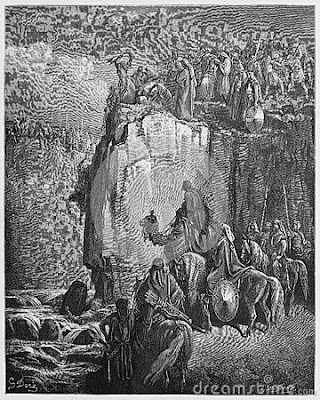Eph4: 8This is why itsays:“When he ascended on high,
he took many captives
and gave gifts to his people.”.....
11So Christ himself gave the apostles, the prophets, the evangelists, the pastors and teachers, 12to equip his people for works of service, so that the body of Christ may be built up ...
THE GIVER:
list the ascension gifts of Christ ( Eph 4:8,10).Which are the gifted ministers of GOD(called"Spiritual leaders") whom Christ has given to his church subsequent to his ascension.Paul states that Christ gave those gifts.
1) For preparing God's people for works of service (Eph4:12).
2)For the spiritual growth of the body of Christ as GOD intended (Eph4:13-16).
 |
| THE 12 APOSTLES of JESUS. |
THE APOSTLE: The word "Apostle" is applied to certain leaders in the NT.The noun apostolos, derived from the verb "Apostello " "to send" generally refers to individuals specifically "called commissioned" and given authority by the lord JESUS Christ to be his representatives in proclaiming the gospel and establishing the church.
- The title is used of JESUS himself(Heb 3:1).
- The twelve disciples(Mt10:2).
- Paul(Ro1:1;2Co1:1;Gal1:1).
- And others(Ac14:4,14;Ro16:7;Gal1:19;2:8-9;1Th2:6-7).
I) APOSTLE IN A UNIQUE SENSE:
a) The term "Apostle" is used in a very special sense to .identify those qualified to bear spirit- inspired witness to Christ.These are the men JESUS personally called and commissioned to be leaders for the sake of his church.The twelve are a unique company whose names will be inscribed to the twelve foundation stones of the new Jerusalem(Rev21:14).
b) Still other apostles are mentioned in the NT who possessed special authority within the church,such as:
- Paul(Gal1:19;2:7-8;1Co15:9).
- Barnabas(Ac 14:4,14).
- James the half brother of JESUS(Gal1:19;2:9;1Co15:7).
- It is not clear whether Silas(1Th1:1;2:1,6-7),Andronicus and Junias(Ro16:7) or others belonged in this level of apostleship.
Apostle in the first century were mentored by JESUS, were closely associated with eye witness(Ac1:21-22) or had a personal post resurrection encounter with JESUS(1Co15:7-9).The uniqueness of some first century apostle lay in their calling to write Scriptures, the NT Scriptures being recognized as the same authority as the OT Scriptures (2Pe3:16).
II) APOSTLE IN A GENERAL SENSE:
a) The term "Apostle" was used in the NT in a non-technical general sense to identify commissioned representatives of a church,such as a messenger appointed and sent as a missionary or for some other special responsibility(Ro16:7;2Co8:23;Php2:25).
Apostle in this general sense remain essential to fulfilling God's purpose in the church.If the church ceases to have spirit-filled apostolic leaders who point the way in spreading the gospel to the world,it's spiritual and numerical growth will be stunted.On the other hand as long as the church recognizes Christ's gifts and callings by releasing such leaders as church planters at home and for the nations,the church will fulfill it's mission and remain faithful to the lord's Great Commission.
 |
| commissioned representatives of a church. |
III) A very important distinction in the use of the term "APOSTLES":
a) Some of the original first century Apostles were uniquely commissioned to write Scripture,and therefore must be carefully distinguished from all Christian leaders who have followed them.The 27 books of the NT called the "APOSTOLIC DEPOSIT" stand apart from all other christian literature.It safeguards the integrity of christian teaching in all subsequent ages.To reject the inspired revelation of NT apostolic truth is to cease being a church according to the biblical pattern and is to reject the LORD him self(Jn16:12-15;1Co14,36-38;Gal1:9-11).And on the other hand,to believe the NT Apostolic message,obey it and guard it against all distortion is to remain true to the Holy Spirit(Ac20:28;2Ti1:14)and to guarantee God's continued blessing and presence within the church(see Eph2:20).All theology experience and practice,and all spiritual manifestation must be evaluated in the light of Scripture.
 |
| APOSTOLIC DEPOSIT |
b) At the same time,it is clear that certain aspects of the NT Apostolic leadership were intended to continue throughout the history of the church(see Eph4:11-13). To insure that the uniqueness of the first century Apostles and their authority to write scripture are safeguarded,and at the same time encourage the recognition of the Apostolic ministries in the church today, it may be helpful to use terminology like "Apostolic" leaders or functions rather than "The office of Apostle" at this point in history.In effect, this discourages a misuse of the title of Apostle that often times opens the door to serious abuses,on the other hand, it recognizes the place and importance of apostolic functions and Biblical services associated with pioneer ministries.
c) In connection with( Eph4:11-13), the conjunction "until" (Eph4 :13) indicates that all the five fold leadership ministry gifts(including the apostolic ministry) continue to be essential for bringing the corporate body of Christ worldwide to the level of mature fullness in and for Christ as is described in (Eph4:13).
Eph4: 13until we all reach unity in the faith and in the knowledge of the Son of God and become mature, attaining to the whole measure of the fullness of Christ.
Dear Readers
Do you have any other knowledge about the work of the Apostolic ministry? Pls share your knowledge with me.
































.jpg)
.jpg)
.jpg)
.jpg)
